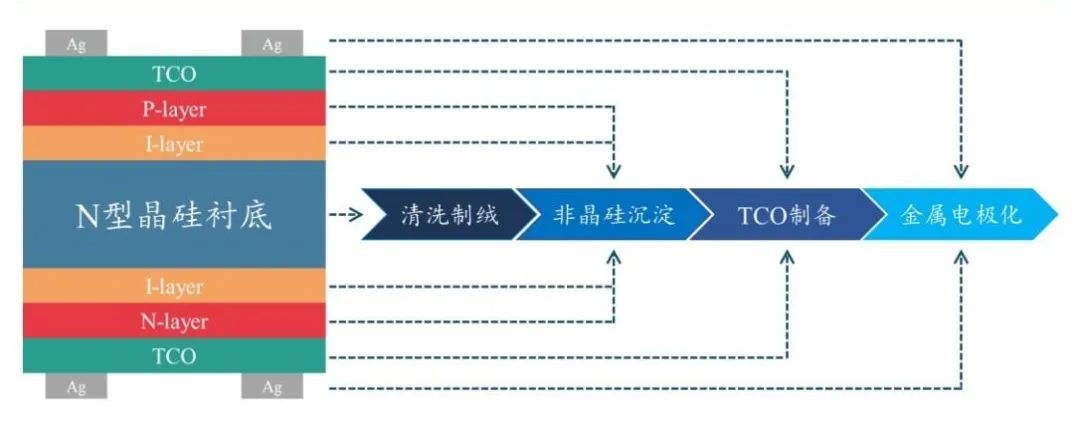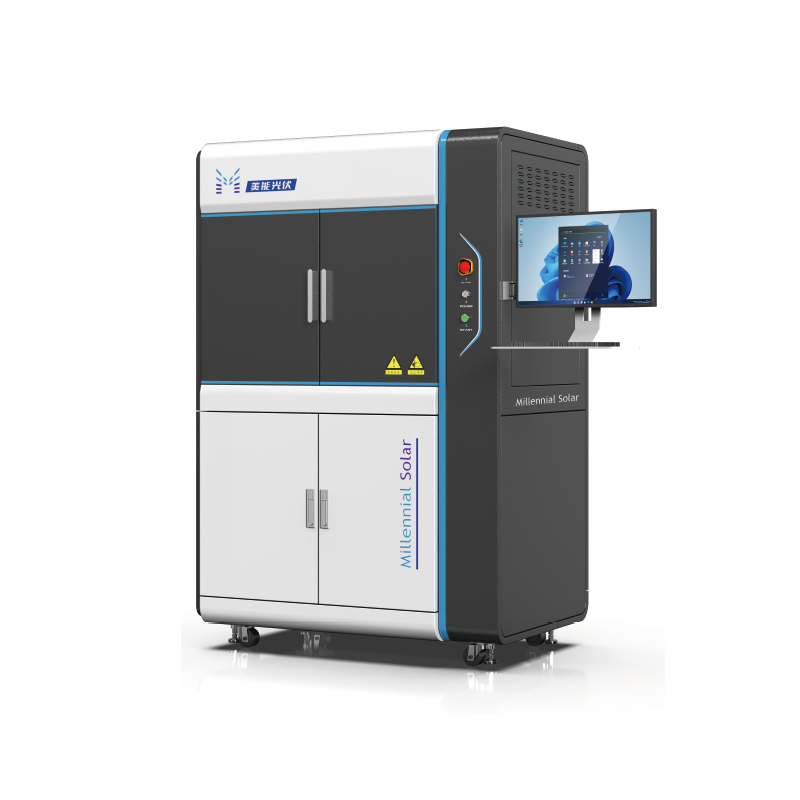
量子效率测试仪
PL/EL一体机
Sinton硅片少子寿命测试仪
Sinton硅块少子寿命测试仪
绒面反射率测试仪
3D共聚焦显微镜
在线四探针方阻测试仪
全自动扫描四探针方阻测试仪
在线薄膜厚度测试仪
晶化率测试仪
Horiba显微共焦拉曼光谱仪
傅里叶红外光谱仪
霍尔效应测试仪
分光光度计
全光谱椭偏仪
Horiba椭圆偏振光谱仪
TLM接触电阻率测试仪
超景深显微镜
网版智能影像测量仪
全自动影像测量仪
卧式拉力机
电池片稳态光衰老化试验箱
电池片紫外老化试验箱
电池片拉脱力综合测试仪
外观检验台
湿漏电测试系统
组件实验室EL测试仪
紫外老化试验箱
稳态光衰老化试验箱
电流连续性监测系统
PID测试系统
旁路二极管测试系统
LeTID测试系统
反向电流过载系统
脉冲电压测试系统
绝缘耐压测试仪
接地连续性测试仪
绝缘耐压接地测试仪
湿热环境试验箱
湿冻环境试验箱
热循环试验箱
动态机械载荷测试机
静态机械载荷测试机
冰雹冲击试验机
引出端强度试验机
霰弹冲击试验机
抗划伤(切割)测试机
剥离试验机
万能材料试验机(单臂)
万能材料试验机(双臂)
光伏玻璃透过率测试仪
醋酸测试试验箱
交联度测试系统
二极管接线盒综合测试仪
落球冲击试验机
半自动四探针
全自动探针式台阶仪
多通道太阳能MPPT系统
Horiba稳瞬态荧光光谱仪
大面积钙钛矿方阻椭偏二合一测试仪
大面积钙钛矿影像显微二合一监测站
钙钛矿P1激光划线测试仪
钙钛矿在线PL测试仪
钙钛矿在线方阻测试仪
钙钛矿在线膜厚测试仪
钙钛矿工艺检测工作站
手持式IV测试仪
便携式EL测试仪
手持热成像测试仪
户外组件多通道测试系统
光伏逆变器电能质量测试仪
无人机EL检测仪
IV测试仪
IVEL分选机
美能光伏科普 | 深入了解异质结电池的光谱响应
日期:2023-07-31浏览量:340
随着光伏电池种类的日益增多,其发展也逐渐提上了日程。其中,异质结太阳能电池作为太阳能新型电池,逐渐成为光伏电池的“先行者”。在异质结太阳能电池的性能测试中,光谱响应是仅次于I-V特性的重要特性。为了适应太阳能电池时代的发展,「美能光伏」推出了可保障异质结电池量子效率的美能QE量子效率测试仪帮助光伏企业用户解决产品质量问题!今天,「美能光伏」将给您介绍异质结电池光电效应。

![]()
什么是异质结太阳能电池?
HJT(heterojunction)——本征薄膜异质结电池。异质结太阳能电池具备双面电池结构,中间为N型晶体硅。正面依次沉积本征非晶硅薄膜和P型非晶硅薄膜,从而形成P-N结。背面则依次沉积本征非晶硅薄膜和N型非晶硅薄膜,从而形成背表面场。

HJT太阳能电池结构示意图
![]()
什么是光谱响应?
在太阳能电池中,光谱响应是非常重要的特性。光谱响应是表示不同波长的光子被太阳能电池吸收后产生的电子—空穴对并形成光电流的能力,也可以被称为光谱效应或者量子效率。
异质结电池的光谱响应就是当某一波长的光照射在其表面时,每一个光子平均产生的能量,且能被利用的载流子数。
![]()
深入了解异质结电池的光谱响应
异质结电池的光谱响应亦可被称为绝对光谱响应和相对光谱响应。
绝对光谱响应是各种波长不同的单位辐射光或相对应的光子照射在太阳能电池片上,从而产生不同的短路电流,根据不同波长的分布求得相对应的短路电流变化曲线。
相对光谱响应是每一波长以一定等量的辐射光或者等光子数照射在太阳能电池片上,并通过其产生的短路电流与产生的最大短路电流进行比较,从而按照波长的分布求得其比值变化曲线。无论是绝对光谱响应还是相对光谱响应,光谱响应曲线峰值越高,越平坦,对应电池的短路电流就越大,效率也会越高。

由于光谱响应能反映太阳能电池各层材料的质量,也能反映ITO薄膜质量、辐射损伤和各个界面层的质量,所以异质结电池的光谱响应与电池的结构、材料性能、结深、表面光学特性等因素有关,并且还会随着环境湿度、电池厚度和辐射损伤的变化而变化。
![]()
美能量子效率测试仪

商务联系:张经理 400 - 008 - 6690
美能量子效率测试仪可用来测量太阳能电池的光谱响应,并通过其量子效率来诊断太阳能电池存在的光谱响应偏低区域问题。其产品因其普遍的兼容性、广阔的光谱测量范围、测试的准确性和可追溯性等优势,受到光伏企业用户的热烈追捧!
异质结电池作为太阳能新型电池,凭借其工艺流程短、发展前景深等优势被广泛应用于光伏行业。「美能光伏」推出了可用来测量太阳能电池光谱响应的美能量子效率测试仪,可轻松解决异质结电池出现的光谱响应问题。高效的产品总能给用户带来满意的体验,美能光伏秉承此信念,为光伏赠产品、为电池附质量!









































































